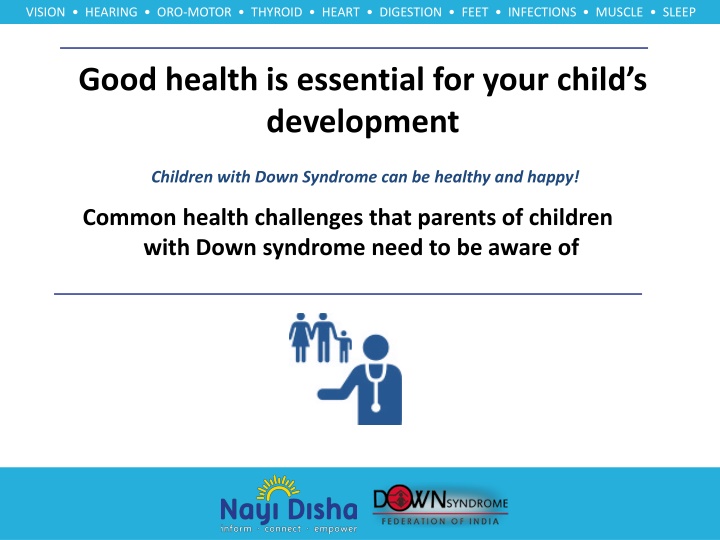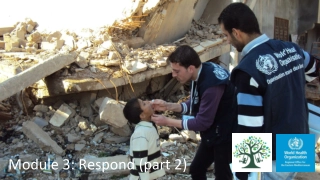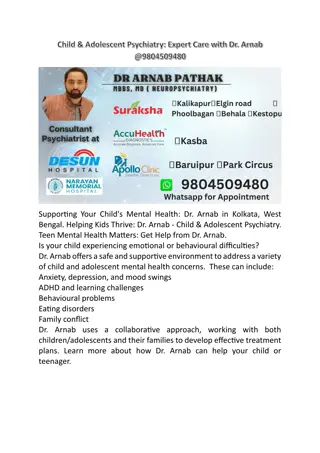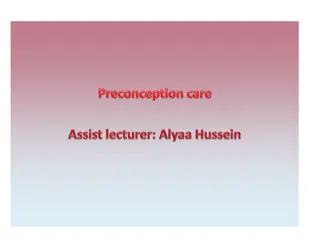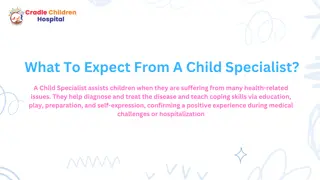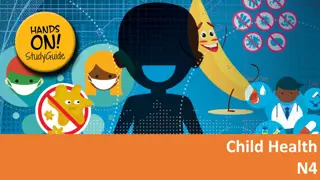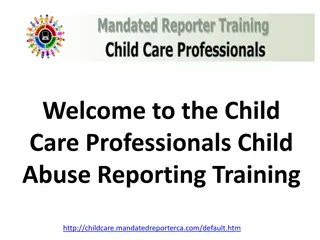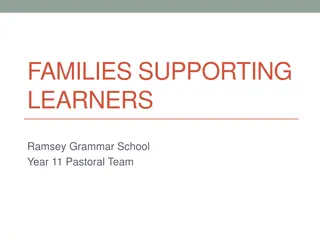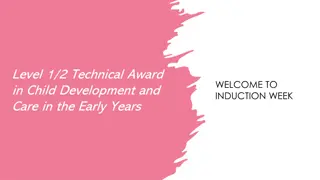Good health is essential for your child’s development
Children with Down Syndrome may face various health challenges affecting vision, hearing, thyroid, heart, digestion, muscle tone, and more. Awareness and proactive monitoring are crucial in managing these challenges to enhance the quality of life for these children.
Download Presentation

Please find below an Image/Link to download the presentation.
The content on the website is provided AS IS for your information and personal use only. It may not be sold, licensed, or shared on other websites without obtaining consent from the author.If you encounter any issues during the download, it is possible that the publisher has removed the file from their server.
You are allowed to download the files provided on this website for personal or commercial use, subject to the condition that they are used lawfully. All files are the property of their respective owners.
The content on the website is provided AS IS for your information and personal use only. It may not be sold, licensed, or shared on other websites without obtaining consent from the author.
E N D
Presentation Transcript
VISION HEARING ORO-MOTOR THYROID HEART DIGESTION FEET INFECTIONS MUSCLE SLEEP Good health is essential for your child s development Children with Down Syndrome can be healthy and happy! Common health challenges that parents of children with Down syndrome need to be aware of
VISION HEARING ORO-MOTOR THYROID HEART DIGESTION FEET INFECTIONS MUSCLE SLEEP Common health challenges in children with Down syndrome (DS) Children with DS have a few common health challenges that have been well identified and reported Awareness and continuous monitoring will help reduce the adverse affects on your child s health Some of these common challenges include: Problems with vision Hearing difficulties Oro-motor issues Thyroid hormone production in the body Heart defects at birth Issues with the digestive system Foot arch challenges Recurrent infections (skin, bladder and respiratory) Low muscle tone Sleep disturbances DS cannot be cured, but, careful management of health challenges can have a big impact on the quality of life of your child
VISION HEARING ORO-MOTOR THYROID HEART DIGESTION FEET INFECTIONS MUSCLE SLEEP Vision Individuals with DS are more likely to experience vision disorders that may include one or more of the following: Common eye defects such as short sightedness, long sightedness, astigmatism, squint eye Developmental cataracts Eye-lid inflammation Conical cornea bulge over the cornea of the eye Nystagmus involuntary movement of the eye Speak to your ophthalmologist (eye doctor) immediately to assess your child s vision, and to get corrective measures for improving vision
VISION HEARING ORO-MOTOR THYROID HEART DIGESTION FEET INFECTIONS MUSCLE SLEEP Hearing Many children with DS experience hearing loss Hearing problems can cause a delay in speech and language skills Possible reasons for hearing loss include: Recurrent chronic ear diseases, partly due to anatomical differences and weaker immune systems Common problems include wax in the external ear canal and middle ear, or due to a condition called glue ear Sensory-neural hearing loss (occurs in 10% of DS children) Speak to your ENT specialist (ear, nose, and throat doctor) immediately to assess your child s hearing
VISION HEARING ORO-MOTOR THYROID HEART DIGESTION FEET INFECTIONS MUSCLE SLEEP Oro-motor parts Oral/facial developmental deficits affect the lips, tongue, teeth, and mouth palate in children with DS Low muscle tone makes it difficult for feeding and chewing Recurrent infections, often due to low immunity or poor hygiene, can cause inflammation of the teeth and gums, as well as tooth decay Most children with DS have hyposensitivity issues with food This means that a child with DS may be unable to feel things in their mouth the way they ought to be felt These and other sensitivity concerns can hold the child back from both feeding properly and speaking clearly Speak to your dentist to assess your child s oral health, and to get appropriate treatment immediately
VISION HEARING ORO-MOTOR THYROID HEART DIGESTION FEET INFECTIONS MUSCLE SLEEP PT = Physiotherapist OT = Occupational Therapist ST = Speech Therapist Oro-motor Issues: THERAPEUTIC INTERVENTION Therapy provided by PT, OT and ST often compliment one another, & seek to holistically tackle specific developmental challenges PT PT + OT: tackle motor deficits Work together for best results OT Help in suggesting feeding and positioning techniques (of the child) ST Help to build oral muscle strength through tools and exercises beneficial for both feeding abilities and communication OT + ST: tackle feeding and oral sensory deficits
VISION HEARING ORO-MOTOR THYROID HEART DIGESTION FEET INFECTIONS MUSCLE SLEEP Oro-motor Issues:THERAPEUTIC INTERVENTION Do not hesitate to encourage open dialogue between your therapists, to address the specific needs of your child that they will most effectively tackle by working together YOU are the central focal point of early intervention therapy for your child, which you can ensure by integrating various therapies together rather than individual attention to any specific therapy at any given point in time Lastly, begin therapy intervention for your child ASEARLY AS POSSIBLE to ensure maximum benefits for your child s development and well-being Please consult our video series for detailed information about oro-motor exercises for speech clarity in children with DS
VISION HEARING ORO-MOTOR THYROID HEART DIGESTION FEET INFECTIONS MUSCLE SLEEP Thyroid Hypothyroidism, or low thyroid levels (a hormone) is common in children with DS Symptoms include: fatigue, constipation, depression, weight gain This condition can be effectively treated through medication, with regular monitoring of thyroid levels Thyroid maintenance in the child s body can go a long way in improving his/her overall health Thyroid gland Speak to your Endocrinologist (hormone specializing doctor) and/or Pediatrician immediately to monitor your child s hormone levels at regular intervals and to start treatment
VISION HEARING ORO-MOTOR THYROID HEART DIGESTION FEET INFECTIONS MUSCLE SLEEP Heart A majority of individuals with DS have a heart defect medically called the atrial septal defect This birth defect appears as a hole in the heart wall separating the two chambers Speak to your Cardiologist (heart doctor) and/or pediatrician immediately to understand if your child qualifies for immediate surgery to rectify the defect
VISION HEARING ORO-MOTOR THYROID HEART DIGESTION FEET INFECTIONS MUSCLE SLEEP Digestion Digestive system issues occur in children with DS because of: Inherent structural complications in the gastrointestinal (GI) tract (such as in the esophagus, anus, small intestine or colon) Weakness in the muscles involved in the act of chewing Presence of a small oral cavity Restricted movement of the tongue Weak muscle coordination Misaligned teeth Weak digestive enzymes in the gut The inability of the body to digest wheat protein gluten (called gluten intolerance), thus causing digestive problems. (see next slide) Speak to your Pediatrician and Nutritionist about dietary changes that can help reduce digestive distress in your child
VISION HEARING ORO-MOTOR THYROID HEART DIGESTION FEET INFECTIONS MUSCLE SLEEP Digestion Digestive issues can include the inability of the body to digest wheat protein, or gluten, this is called gluten intolerance Some children with DS have an intolerance to gluten at a higher rate than typical children, though this isn t a common issue. Symptoms of gluten intolerance can include: increased frequency of stool bad smelling stool vomiting pain in abdomen bloating irritability loss of weight constipation distended abdomen Unless proven otherwise, don't withdraw wheat from your child's diet, but do speak to your pediatrician and nutritionist *Consult Nayi Disha s nutrition booklet and audio series (Hindi)* Speak to your Pediatrician and Nutritionist about dietary changes that can help reduce digestive distress in your child
VISION HEARING ORO-MOTOR THYROID HEART DIGESTION FEET INFECTIONS MUSCLE SLEEP Digestion Constipation is common in persons with DS, and is mainly due to: low muscle tone thyroid malfunctions weak digestive enzymes faulty feeding habits Dietary modifications can help overcome constipation Oro-motor exercises from an OT (occupational therapist) can help in improving muscle strength and coordination For infants, allowing them to engage in tummy time strengthens their upper body and can help them cope with digestive problems *Consult Nayi Disha s nutrition booklet and audio series (Hindi)* Speak to your Pediatrician and Nutritionist about dietary changes that can help reduce digestive distress in your child
VISION HEARING ORO-MOTOR THYROID HEART DIGESTION FEET INFECTIONS MUSCLE SLEEP Foot Arch Children with DS also may present a foot deformity that causes the arch of the foot to remain flat, as opposed to the arch seen in typical children, due to loose ligaments and low muscle tone The arch in the foot is meant to distribute the body weight equally, thus reducing strain on the bones, muscles and ligaments, promoting body flexibility The flatness of the arch of the foot hampers the ability to walk, run and jump by impairing balance Visit Dr. Nina Piysh s blog for activities that can help strengthen muscles that form the foot arch Weight shifts to the inside of the foot sole Weight evenly distributed FLAT FOOT NORMAL FOOT Speak to your Orthopedic surgeon for concerns related to the foot arch. Also consult your Physiotherapist for exercises to strengthen foot arch muscles.
VISION HEARING ORO-MOTOR THYROID HEART DIGESTION FEET INFECTIONS MUSCLE SLEEP Body immunity and infections Low immunity is a common concern in children with DS This increases the risk for recurrent infections in the body of the child Ways to manage recurring infections: proper hygiene diet rich in immunity boosters drinking adequate water adequate intake of Omega 3 & 6 FA avoiding processed and packed food Respiratory infections Common in the first 5 years Also due to fluid accumulation in the ear of the child Prone to frequent incidents of cold and cough Consult a Pediatrician Bladder infections For more information about nutritional means to manage urinary infections, see our nutrition booklet Consult a Pediatrician Consult a Dermatologist Skin infections
VISION HEARING ORO-MOTOR THYROID HEART DIGESTION FEET INFECTIONS MUSCLE SLEEP Muscle Tone Poor muscle tone contributes to the delays in walking and crawling in children with DS These individuals also appear to have weak joints due to ligament problems The is often the reason for delayed motor milestones in these children However, note that even with low muscle tone issues, children with DS can learn to participate in physical activities like other children by strengthening their muscles with physiotherapy exercises. Speak to your Physiotherapist about exercises that can improve brain-body coordination to improve your child s muscle tone as early as possible
VISION HEARING ORO-MOTOR THYROID HEART DIGESTION FEET INFECTIONS MUSCLE SLEEP Muscle Tone In typically-developing children, body weight falls on the child s bones and muscles equally when standing In children with DS, who have weak muscle tone, body weight will fall on his/her bones and joints, which may result in bending of the vertebral column and cause premature degeneration of the joints Note to parents: Parents should not be hasty or put undue stress on the child to achieving motor milestones such as standing or walking Speak to your Physiotherapist about exercises that can improve brain-body coordination to improve your child s muscle tone as early as possible
VISION HEARING ORO-MOTOR THYROID HEART DIGESTION FEET INFECTIONS MUSCLE SLEEP Muscle Tone:THERAPEUTIC INTERVENTION PT OT PT + OT: Helps tone the small muscles and smaller joints. Helps achieve self-care daily living skills such as brushing, bathing, filling bottles, playing with rattle, turning pages, folding cloths and buttoning, etc. Helps strengthen large muscles and big joints. Helps achieve skills such as walking, running, cycling, balancing, jumping, etc. The best results come from working together PT = Physiotherapist OT = Occupational Therapist
VISION HEARING ORO-MOTOR THYROID HEART DIGESTION FEET INFECTIONS MUSCLE SLEEP Muscle Tone:THERAPEUTIC INTERVENTION Note to parents: Typically physiotherapy/occupational therapy sessions are conducted a couple of times per week A good therapist (physiotherapist/occupational) will provide you with a roadmap and explain activities/exercises to be done at home with your child Always remember, you as parents play a key role in the child's development and are the best teachers Speak to your Physiotherapist about exercises that can improve brain-body coordination to improve your child s muscle tone as early as possible
VISION HEARING ORO-MOTOR THYROID HEART DIGESTION FEET INFECTIONS MUSCLE SLEEP Sleep patterns Disturbances in breathing pattern during sleep (called sleep apnea), is one of the most common challenges in persons with DS The most common causes of sleep apnea in children with DS are: Difference in anatomy of the tongue, nose, and passage Inflamed adenoids and tonsils Nasal block Lower respiratory tract infection and/or congestion Backward falling of tongue in sleeping posture (due to low muscle tone) Obesity Weak respiratory muscle coordination. Speak to your ENT specialist (ear, nose and throat doctor) about managing sleep disturbances in your child
VISION HEARING ORO-MOTOR THYROID HEART DIGESTION FEET INFECTIONS MUSCLE SLEEP Sleep patterns Measures to help limit the impact of sleep apnea on your child include: Train a habit of sleeping at 40* in recline and on one side Giving a drop of normal saline in both the nostrils at bedtime Supplementing a diet that builds immunity Removal of adenoids if found inflamed but NOT tonsils (there are separate criteria to remove tonsils. Do not be hasty in removing tonsils. They are the SAFEGUARDS for your child s immunity) Water vapour inhalation twice a day (especially before going to bed) Hot water compress for young kids There are options of reconstructive surgeries available, for e.g. CPAP We need to weigh the extent of problems created by sleep apnea and the cost, danger and effectiveness of the solutions we are opting for to overcome the concerned problems
VISION HEARING ORO-MOTOR THYROID HEART DIGESTION FEET INFECTIONS MUSCLE SLEEP The health concerns commonly seen in children with DS may appear multifold But, with early identification and appropriate intervention several health challenges can be managed effectively, thus improving the quality of life of your child This content has been developed in collaboration with the Down Syndrome Federation of India (DSFI). DSFI is a parent support group started by Dr. Surekha Ramachandran in order to help persons with Down syndrome and their families to come to terms with Down syndrome. Nayi Disha Resource Centre is an online information resource platform that supports families of persons with Intellectual and Developmental Disabilities (IDD). Our consultant Pediatrician, Dr.Nina Piyush Vaidya (M.B D.Ped, PGDGC) has offered expert advice and guidance in consolidating this information.
